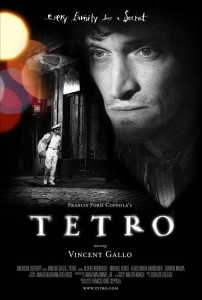 Some might say that “Tetro†is Francis Ford Coppola’s comeback film, although he came out of retirement in 2007 with “Youth Without Youth.†It wouldn’t be accurate to call either one a comeback, though – if you think about the films Coppola’s famous for, a movie like “Tetro†is a kind of anomaly. Of course, that shouldn’t suggest that this is a bad thing. Even though his legacy is pretty much secure, it’s nice to see him take a risk with new material.
Some might say that “Tetro†is Francis Ford Coppola’s comeback film, although he came out of retirement in 2007 with “Youth Without Youth.†It wouldn’t be accurate to call either one a comeback, though – if you think about the films Coppola’s famous for, a movie like “Tetro†is a kind of anomaly. Of course, that shouldn’t suggest that this is a bad thing. Even though his legacy is pretty much secure, it’s nice to see him take a risk with new material.
The result is probably Coppola’s most personal film and, according to him, his most beautiful one.
Part of what makes it so personal is Coppola’s own script, which is his first original screenplay since “The Conversation.†That one got lots of acclaim in 1974, probably because of the way it caught everyone off-guard – once you hit the big time with an epic like “The Godfather,†a quiet triumph like “The Conversation†feels like a surprise detour. The advantage here is that the material felt more intimate, and he probably felt closer to it than anything else he’d done. He approaches “Tetro†with the same kind of honesty and, like “The Conversation,†it might be more personal than people expect.
Tetro (Vincent Gallo) lives in Buenos Aires with his girlfriend, Miranda (Maribel Verdú). His estranged brother, Bennie (Alden Ehrenreich), does menial work on a cruise ship, which comes to Buenos Aires for a few days to be repaired. When Bennie comes to Tetro’s apartment to reconnect with him, he’s heartbroken to find that his brother has become icy and indifferent. Although Miranda likes Bennie and tries to make him feel at home, it makes her sad to see Tetro try to keep him out of his life, especially because she can’t understand why he’s being so cruel.
Things get worse when Bennie tries to learn more about his brother – he stumbles upon Tetro’s abandoned writings, which he began years ago as an aspiring playwright. Although it’s a drama, Bennie senses it’s autobiographical, especially since the hero struggles with someone who resembles their father, a celebrated conductor (Klaus Maria Brandauer). Their relationship in Tetro’s play explains a lot to Bennie, who never understood who Tetro resented his family. Bennie gets closer to Tetro as he learns more about him, but Tetro still keeps his most painful secrets to himself.
Actually, the whole film is about painful secrets, and how people can be emotionally handicapped by them. As a matter of fact, Tetro’s handicap is literal – when the film begins, he’s still recovering from an accident that put his leg in a cast, which forces him to walk on crutches. The demons that haunt him are as obvious as the cast on his leg, but there’s more to Tetro’s past than Bennie understands. Bennie, on the other hand, has demons of his own, and he probably hopes to exorcise them by helping Tetro.
Their relationship is more mysterious than either one of them realizes.

Leave a Reply